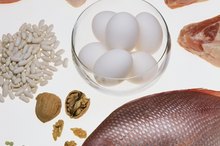What does fact checked mean?
At Healthfully, we strive to deliver objective content that is accurate and up-to-date. Our team periodically reviews articles in order to ensure content quality. The sources cited below consist of evidence from peer-reviewed journals, prominent medical organizations, academic associations, and government data.
- National Academy of Sciences; Slow and Fast Dietary Proteins Differently Modulate Postprandial Protein Accretion; Y. Boirie, et al.; December 1997
- National Academy of Sciences; Slow and Fast Dietary Proteins Differently Modulate Postprandial Protein Accretion; Y. Boirie, et al.; December 1997
- "British Medical Journal"; Incidence and Recognition of Malnutrition in Hospital; J.P. McWhirter, et al.; April 1994
- "Nutrition Journal"; Nutrition Support to Patients Undergoing Gastrointestinal Surgery; Nicola Ward; December 2003
The information contained on this site is for informational purposes only, and should not be used as a substitute for the advice of a professional health care provider. Please check with the appropriate physician regarding health questions and concerns. Although we strive to deliver accurate and up-to-date information, no guarantee to that effect is made.
Protein Intake After Surgery
Protein deficiency is frequently observed among patients admitted in hospitals. According to a study published in the "British Medical Journal" in April 1994, almost 40 percent of surgical and medical patients are malnourished at the time of admission and experience further nutritional depletion during their stay in the hospital 3. Undergoing surgery places patients under tremendous metabolic stress, and extra protein is important to help deal with the increased metabolic activity of wound healing.
Proteins
Proteins are an important part of your body. Thousands of new proteins are manufactured in your body every day and are made up of amino acids. Your body uses 13 amino acids but cannot make nine of them, which are considered to be essential. The body’s requirements for these essential amino acids are met by eating protein in your diet. Complete proteins, like animal protein, contain all of the essential amino acids. Incomplete proteins, like plant protein, are deficient in certain essential amino acids. Vegetarians should consume more than one type of protein in their diet to ensure adequate intake.
- Proteins are an important part of your body.
- Complete proteins, like animal protein, contain all of the essential amino acids.
Effect of Surgery
USDA Recommendations of Protein in Diet
Learn More
Surgical patients show an increase in production of protein. However, even this increased rate fails to meet the amino acid requirement for replacing the skeletal muscle tissue which has been broken down during surgery. According to a study published in "Spine" medical journal in November 1996, the rate of post-operative complications is considerably lowered when the nutritional status of the patient is adequate 1. Protein supplementation decreases the healing time and prevents the loss of skeletal muscle tissue.
- Surgical patients show an increase in production of protein.
- However, even this increased rate fails to meet the amino acid requirement for replacing the skeletal muscle tissue which has been broken down during surgery.
Proteins in Post-Surgical Patients
Surgery causes skeletal muscle tissue to be broken down in order to release amino acids. These amino acids are then transported to the site of injury. They promote wound healing, strengthen the immune system and support vital organs. During healing, new cells are produced to repair the damaged cells, and new tissue and blood vessels also develop. These activities require proteins. If the diet is deficient in proteins, the post surgical recovery is delayed.
- Surgery causes skeletal muscle tissue to be broken down in order to release amino acids.
- During healing, new cells are produced to repair the damaged cells, and new tissue and blood vessels also develop.
Post-Operative Phase
Diet for Recovering From Shoulder Surgery
Learn More
On an average, a patient requires 0.8 to 1 gram of protein per kg of body weight per day. A protein-rich diet is essential to counter the negative protein balance that occurs because of surgery. Ideally, you should choose a slow digesting protein. According to a December 1997 study released by The National Academy of Sciences, this helps to maintain a prolonged period of elevated plasma amino acids 2. This, in turn, increases the periods of protein synthesis leading to accelerated repair of damaged tissue and faster wound healing.
- On an average, a patient requires 0.8 to 1 gram of protein per kg of body weight per day.
- According to a December 1997 study released by The National Academy of Sciences, this helps to maintain a prolonged period of elevated plasma amino acids 2.
Related Articles
References
- "Spine"; Perioperative Nutrition and Postoperative Complications in Patients Undergoing Spinal Surgery; Jeffrey Kline, M.D., et al.; November 1996
- National Academy of Sciences; Slow and Fast Dietary Proteins Differently Modulate Postprandial Protein Accretion; Y. Boirie, et al.; December 1997
- "British Medical Journal"; Incidence and Recognition of Malnutrition in Hospital; J.P. McWhirter, et al.; April 1994
- "Nutrition Journal"; Nutrition Support to Patients Undergoing Gastrointestinal Surgery; Nicola Ward; December 2003
- Atherton PJ, Smith K. Muscle protein synthesis in response to nutrition and exercise. J Physiol. 2012;590(5):1049-1057. doi:10.1113/jphysiol.2011.225003
- Wolfe RR. Branched-chain amino acids and muscle protein synthesis in humans: myth or reality?. J Int Soc Sports Nutr. 2017;14:30. doi:10.1186/s12970-017-0184-9
- U.S. National Library of Medicine. MedlinePlus. Amino acids. October 8, 2020.
- National Center for Biotechnology Information. PubChem Compound Summary for CID 6274, Histidine.
- Berrazaga I, Micard V, Gueugneau M, Walrand S. The role of the anabolic properties of plant- versus animal-based protein sources in supporting muscle mass maintenance: a critical review. Nutrients. 2019;11(8). doi:10.3390/nu11081825
- Churchward-Venne TA, et al., Nutritional regulation of muscle protein synthesis with resistance exercise: strategies to enhance anabolism, Journal of Nutrition and Metabolism, 2012
- Pasiakos SM, et al., Leucine-enriched essential amino acid supplementation during moderate steady state exercise enhances post exercise muscle protein synthesis, American Journal of Clinical Nutrition, 2011
Writer Bio
Lacretia Hardy is a health coach and has been a published writer since 1992. Her work has appeared in several publications, including "Patient In Charge," and on various websites. Hardy holds a Bachelor of Science in health science, as well as certificates in food and nutrition education and holistic health counseling.









